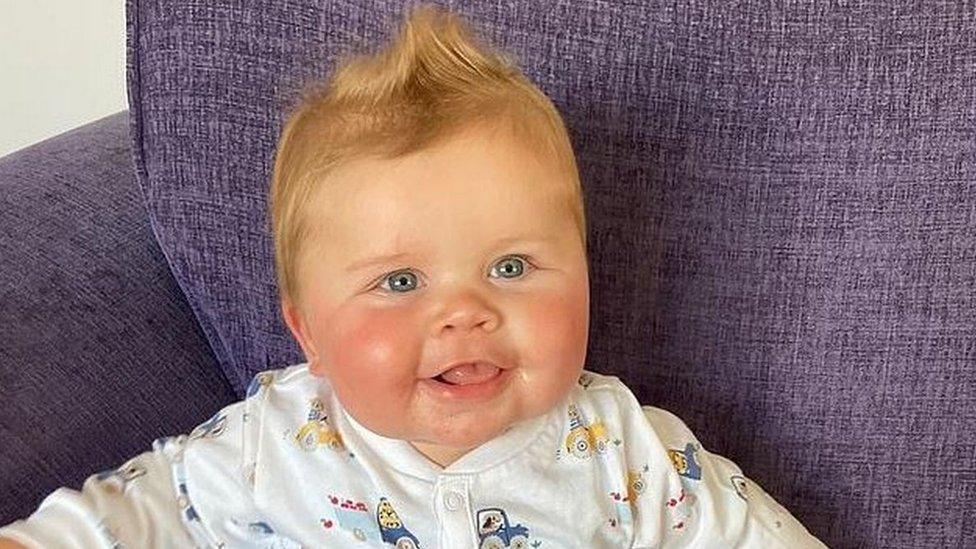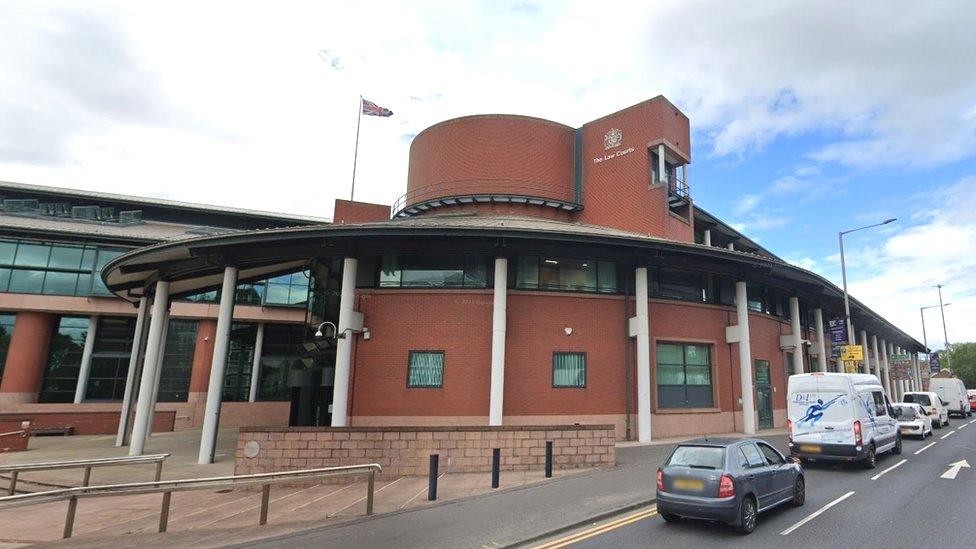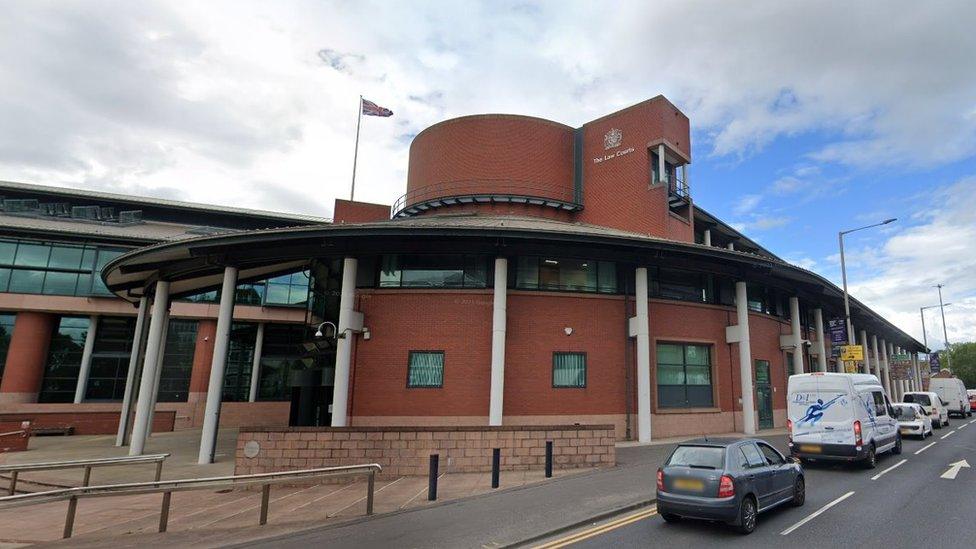Leiland-James Corkill case: Laura Castle 'forever known as baby killer'
- Published

Leiland-James Corkill died on 7 January 2021 at the Barrow home of Laura and Scott Castle
A woman accused of murdering a boy she was trying to adopt never meant to harm him and will forever be known as a "baby killer", her lawyer told a jury.
Leiland-James Corkill died at 13 months in January 2021, a day after suffering brain injuries at the home of Laura and Scott Castle in Barrow, Cumbria.
Mrs Castle, 38, admits manslaughter but denies murder.
Mrs Castle's lawyer told Preston Crown Court the "horrific" killing "was not what was ever intended".
The court has heard Leiland-James was moved into the Castle's home by Cumbria County Council's social workers in August 2020 but the couple struggled to bond with him.
On 6 January, Mrs Castle called 999 to say he had fallen from the sofa, but doctors at Alder Hey Children's Hospital in Liverpool were sceptical due to the severity of his internal injuries.
Three pathologists said extensive bleeding was consistent with Leiland-James having been shaken with severe force and said his head had been banged on a surface.

Laura and Scott Castle are on trial at Preston Crown Court
On the day her trial opened, Mrs Castle admitted manslaughter and has since told the court she shook him to stop him crying as she was at her wits' end and he hit his head on the arm of the sofa.
In his closing statement to jurors, Mrs Castle's lawyer David McLachlan QC said: "What she did was horrific, killing an innocent baby, but that was not what was ever intended."
Mrs Castle wept in the dock as her lawyer said: "Like it or not, she will forever be remembered as a baby killer."
He said Leiland-James, who she "regarded as her son", would probably be walking and talking by now had he lived but he was not here because of an "inept and inadequate Laura Castle".
He said the boy had "not had the best of starts in his life" and as his main carer, Mrs Castle was there to "protect" and "love" him.
"She failed in that basic duty of care towards him and, worse than that, she's responsible for killing him," Mr McLachlan said, adding: "Shame on her, because her tears in the dock will not bring that little boy back."
'Lost it'
But, he said, jurors had to be sure she intended to cause Leiland-James serious harm or death to find her guilty of murder.
He asked the jurors to consider whether they, "in the agony of the moment", had ever "lost it" as Mrs Castle had.
"If she lost it, was at her wits' end and at that moment in time shook the life out of her son and banged his head on something, at that moment, does she intend to kill or does she intend to cause him really serious harm?" Mr McLachlan said.
He said the Castles were a couple "who wanted children", adding: "They were a family who wanted to do something positive, who wanted to adopt."
He said social workers made weekly visits to the home with "no concern expressed at any stage".
'Good and bad days'
Mr McLachlan referred to text messages exchanged between the couple in which they called Leiland-James vulgar insults while venting frustrations about his struggles to settle in with them.
He said the messages were "not pleasant" but often sent in the early hours when Leiland-James frequently cried and Mrs Castle was alone with him while her husband was at work.
He also showed the court pictures of the Castles and Leiland-James looking happy together, saying there were "good and bad days".
Mr McLachlan asked jurors to consider whether Mrs Castle was "a monster" or a woman who put herself forward to adopt a child "but in reality was reaching her wits' end, stressed and not coping".
He said they should ask if she had "the making of a murderer" or if she was in reality a "failure" who was becoming "desperate, unhappy and isolated" due to her husband's frequent work, and was "almost single-handedly" raising Leiland-James.
Mr McLachlan said: "Scott Castle was working nights, [Mrs Castle] was overwhelmed and she couldn't take it any more and she just wanted [Leiland-James] to stop crying.
"She didn't intend to cause him harm but what she did caused him the worst sort of harm."
Mr McLachlan said the Castles were "not by their nature bad people" otherwise they would never have gone through the adoption process.
He said jurors "may not like" Mrs Castle, they may "detest, despise or even pity" her, but that did not make her a murderer.
'Hindsight a great thing'
Mr Castle, 35, denies causing or allowing Leiland-James' death, and the couple also both deny two child cruelty charges.
In his closing argument, Mr Castle's lawyer Simon Kealey QC said his client was asleep upstairs after a night shift when the boy was fatally injured downstairs.
Mr Kealey said Mr Castle "was not responsible" for Leiland-James' death and jurors should resist the temptation to think he should have done something to stop it.
"It's easy and perhaps understandable to think Scott Castle should have done something more," Mr Kealey said, adding: "Hindsight is a great thing."
'Placate and appease'
Mr Kealey said jurors should judge him based on "what was happening at the time".
He said the prosecution pointed to the "rude and derogatory" Mrs Castle messages sent in September 2021 as evidence Mr Castle should have known Leiland-James was at risk of harm, but the death happened more than three months later, which was "absolutely critical".
Mr Kealey said "even with hindsight", on 5 January there was "no clue or sign to anybody as to what might happen".
He said they were a family "under the spotlight for months" but, apart from the bonding issue, no social workers or health visitors had any concerns and there was "no indication that Leiland-James had been or would be harmed".
The trial continues.

Follow BBC North East & Cumbria on Twitter, external, Facebook, external and Instagram, external. Send your story ideas to northeastandcumbria@bbc.co.uk, external.
Related topics
- Published13 May 2022

- Published12 May 2022

- Published10 May 2022

- Published5 May 2022

- Published4 May 2022

- Published3 May 2022

- Published28 April 2022
